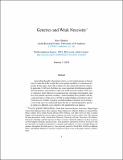Generics and weak necessity
Abstract
A prevailing thought is that generics have a covert modal operator at logical form. I claim that if this is right, the covert generic modality is a weak necessity modal. In this paper, I provide evidence for this claim and I sketch a theory. In particular, I will show that there are some important distributional parallels between generics and sentences with overt weak necessity modals: both sorts of sentences share behavior in nonmonotonic reasoning environments and also lack genuine epistemic readings. Acknowledging these parallels and the connection here is in the service of both our understanding of genericity and of weak necessity. Finally, I propose an understanding of generics as involving a covert weak necessity modal and argue that this is a promising path to pursue in relation to different issues related to the interpretation of generics.
Citation
Thakral , R 2018 , ' Generics and weak necessity ' , Inquiry - An Interdisciplinary Journal of Philosophy , vol. In press . https://doi.org/10.1080/0020174X.2018.1426683
Publication
Inquiry - An Interdisciplinary Journal of Philosophy
Status
Peer reviewed
ISSN
0020-174XType
Journal article
Collections
Items in the St Andrews Research Repository are protected by copyright, with all rights reserved, unless otherwise indicated.

